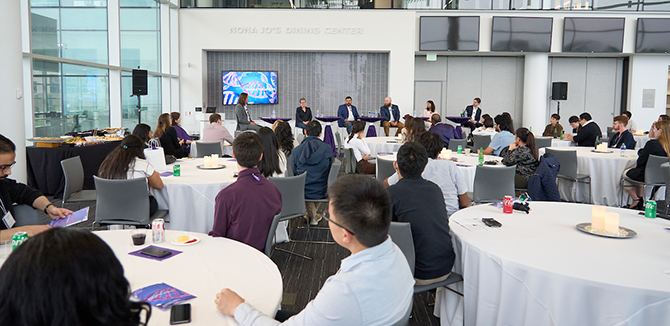The Wait-and-See Approach
Biotech Nexus panelists talked about the current role of artificial intelligence in scientific advancement and why they feel MBP students have nothing to fear from the emerging technology.

Over the past year, the public has learned that artificial intelligence (AI) can pass bar exams, write essays, and create images of people so realistic that it's nearly impossible to tell if the photo is real or fake.
But can AI aid in biotechnological innovation?
That was a topic discussed by a panel of experts at Biotech Nexus, an annual event hosted by Northwestern Engineering's Master of Biotechnology Program (MBP). The gathering featured a discussion among biotech leaders who delved into some of the most pertinent questions facing the industry today for the crowd of current and former MBP students, faculty, and guests.
During the event, audience members asked the panelists for their views on AI and how it could help biotechnology research. Respondents said they are excited to see recent AI advancements but are taking a wait-and-see approach for its role in the field.
“If you're talking about things that are scientific, certainly in biology or chemistry, I always want to see that it actually can predict something that exists today,” said Susan Schofer, partner at SOSV and chief science officer at HAX. “I think it’s yet to be really firmly proven that they can truly predict scientific outcomes by themselves.”
One area that is emerging as an opportunity for AI is with its ability to predict human needs based on previous prompts. Though this is hardly new – think of the ads that show up after you do a Google search for “best new cars 2023” – it could take digital marketing and healthcare assistance to a new level.
Matt Barnes (MBP '10), who joined Schofer on the panel, is a client partner and senior director at IQVIA, a global provider of analytics, technology solutions, and clinical research services to the life sciences industry. He gave the example of a large pharmaceutical company using AI and machine learning (ML) in its commercial operations. Technology can take what a healthcare provider is searching for on the internet and feed a more useful next message to the searcher.
“So maybe they're Googling a certain condition around a certain product online, or maybe they have a patient who just had a lab result,” Barnes said. “We actually have a ML model ingest all these different data sets and then make a recommendation on what the next message should be to promote and market to that healthcare provider.”
While professionals in certain industries fear AI may replace them, the panelists said they weren’t worried about being replaced by technology anytime soon. Panelist Paul Marks (MBP '17), who is a product specialist of tangible flow filtration and filtration systems for Sartorius, said many scientific processes in biotechnology are extremely hands-on at key points and will remain that way for the foreseeable future.
Phillip Freeman (MBP '21), process development manager for Clever Carnivore, agreed.
“As far as trusting it to predict scientific outcomes, I think there's still probably a long way to go,” he said. “Using it for research and to make your life easier, that’s one thing, but in terms of predicting scientific outcomes, I think we need to see some results before we fully trust it to implement in our processes.”

